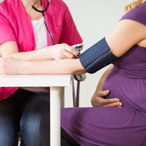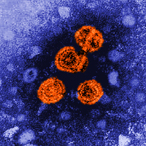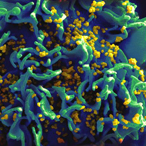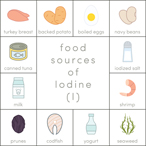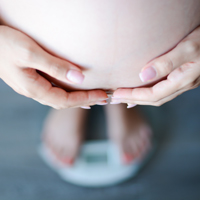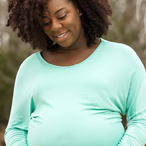Elevated blood pressure before conception may increase the chances for pregnancy loss, according to an analysis by researchers at the National Institutes of Health. The authors conclude that lifestyle changes to keep blood pressure under control could potentially reduce the risk of loss. The study appears in Hypertension.
News
NICHD issues News Releases and Media Advisories to the news media. Spotlight and Research Feature articles explain NICHD research findings and public health issues to the general public. An Item of Interest is a short announcement of relevant information, such as a notable staff change.
Item of Interest: NICHD reports success of data sharing resource, two years after launch
More than two years after its inception, NICHD’s Data and Specimen Hub (DASH) has received 73 data access requests and resulted in 3 published studies.
Release: Antiviral drug not beneficial for reducing mother-to-child transmission of hepatitis B when added to existing preventatives, study shows
An antiviral drug commonly prescribed to treat hepatitis B infection does not significantly reduce mother-to-child transmission of hepatitis B virus, according to a clinical trial funded by NIH.
Release: NIH-funded researchers identify risk factors for sleep apnea during pregnancy
Snoring, older age and obesity may increase a pregnant woman’s risk for sleep apnea—or interrupted breathing during sleep—according to researchers funded by the National Institutes of Health.
Media Advisory: Induced labor after 39 weeks in healthy women may reduce need for C section
Healthy first-time mothers whose labor was induced in the 39th week of pregnancy were less likely to have a cesarean delivery, compared to a similar group who were not electively induced at 39 weeks, according to a study funded by the National Institutes of Health.
News Release: NIH Begins Large HIV Treatment Study in Pregnant Women
The National Institutes of Health has launched a large international study to compare the safety and efficacy of three antiretroviral treatment regimens for pregnant women living with HIV and the safety of these regimens for their infants.
Science Update: Folic acid, multivitamins before and during pregnancy may reduce autism risk, suggests NIH-funded study
Children born to women who took either folic acid or a daily multivitamin before or during pregnancy were less likely to have a child diagnosed with an autism spectrum disorder, compared to children whose mothers did not take any prenatal vitamins, according to researchers funded in part by the National Institutes of Health.
News Release: Iodine deficiency may reduce pregnancy chances, NIH study suggests
Women with moderate to severe iodine deficiency may take longer to achieve a pregnancy, compared to women with normal iodine levels, according to a study by researchers at the National Institutes of Health.
Spotlight: Zika Research after Hurricane Maria
Dr. Carmen Zorrilla, who leads NICHD’s Zika in Infants and Pregnancy (ZIP) study in Puerto Rico, reports on how Hurricane Maria affected the Island’s largest hospital in San Juan.
Media Advisory: Air pollution exposure in early pregnancy linked to miscarriage, NIH study suggests
Exposure to common air pollutants, such as ozone and fine particles, may increase the risk of early pregnancy loss, according to an NIH study.
News Release: Obesity during pregnancy may lead directly to fetal overgrowth, NIH study suggests
Obesity during pregnancy—independent of its health consequences such as diabetes—may account for the higher risk of giving birth to an atypically large infant.
Second trimester weight gain associated with fetal growth in twin pregnancies
A woman’s weight gain in the second trimester of a twin pregnancy is most closely associated with fetal growth and the size of the babies at the time of birth, according to a prospective study by researchers at the NICHD.
NICHD research links air pollution and extreme temperature to stillbirth risk
NICHD’s Pauline Mendola examines whether air pollution and extreme temperature increase the risk of stillbirth.
Malaria drug protects fetal mice from Zika virus, NIH-funded study finds
Hydroxychloroquine, a drug approved by the Food and Drug Administration to treat malaria and certain autoimmune diseases in pregnant women, appears to reduce transmission of Zika virus from pregnant mice to their fetuses, according to a study funded in part by the National Institutes of Health.
NIH launches prospective study of Zika and HIV co-infection during pregnancy
The National Institutes of Health has launched a study to determine the potential risks that infection with the Zika virus might pose for pregnancies in which the mother is also infected with HIV.
NICHD’s Safe to Sleep Campaign with Dr. Marian Willinger
A conversation with Dr. Marian Willinger before her retirement. Dr. Willinger helped launch NICHD’s Safe to Sleep campaign and led research efforts on Sudden Infant Death Syndrome, stillbirth and infant health.
Socioeconomic disadvantage linked to immune activity during pregnancy
Infants born to mothers in poverty had a greater chance of developing neurological problems within the first year of life, according to a study by researchers at the National Institutes of Health (NIH) and Harvard University.
NIH-led workshop addresses opioid misuse during pregnancy
Experts convened for an NICHD workshop identified research gaps and opportunities to improve outcomes for women affected by opioid use disorder, their newborn infants and their families.
News Release: NIH launches PregSource, a crowdsourcing project to better understand pregnancy
PregSource is a research project led by NICHD that aims to improve knowledge of pregnancy by collecting information directly from pregnant women.
NIH-led task force to address research needs of pregnant women and nursing mothers
A new task force created by the 21st Century Cures Act and led by NICHD will advise the Secretary of Health and Human Services on research needed to optimize therapies for pregnant women and nursing mothers. The first meeting will be held on August 21-22, 2017 at NIH.
 BACK TO TOP
BACK TO TOP
